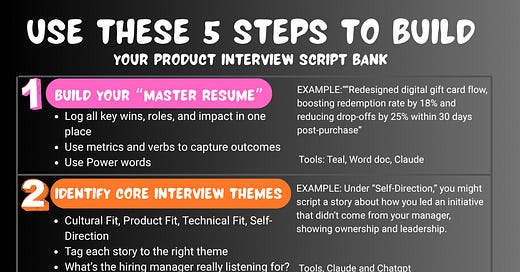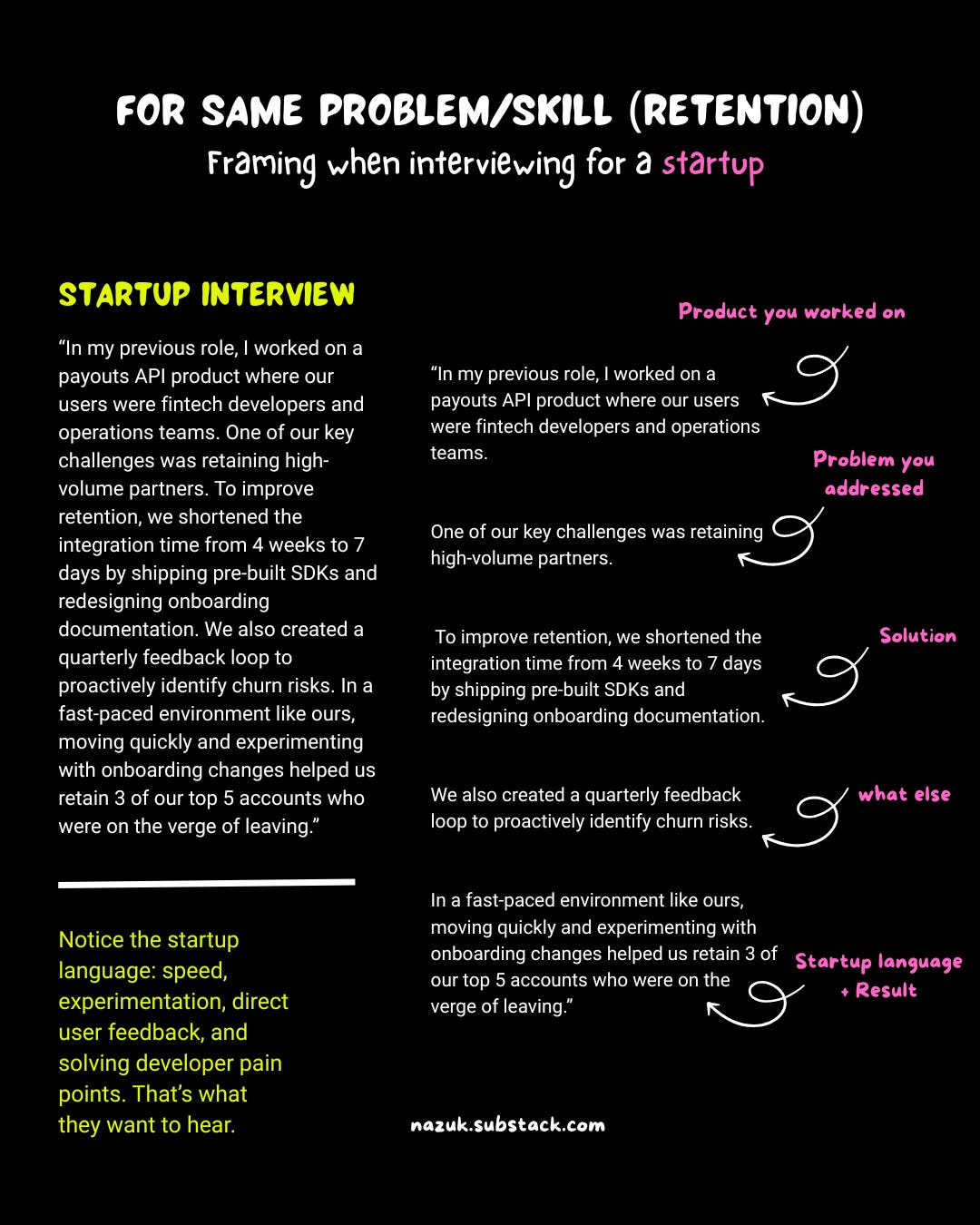Wrong examples and language led me to fail my interview
Using chatgpt How to build tailored custom responses for every interview
You are reading a FREE once-a-month newsletter. If you find it valuable, consider becoming a paid member. Grab 30% OFF. Offer only till I hit 100 paid subs.
Today’s Deep(er) Dive
Not all interviews are created equal.
Throughout my career journey, if I take an example, I’ve worked in fintech, healthcare, and retail. I’ve moved across different domains.
even within fintech, I’ve had diverse experience i.e., within mortgage, payouts, virtual cards, cross-border payments, you name it.
so every time I go into an interview, whether it’s for a startup, a mid-sized company, or a large one (And I have worked in all 3 types including working for largest bank in the US and worlds #1 most admired company, yes, it’s true), My responses are tailored to what that interviewer is looking for.
This sounds very common-sensical…
but allow me to share a story when I failed an interview when I badly needed the job and how it shaped my interview prep forever.
One time, I interviewed at a startup in the healthcare supplements space. They had a software product too, and I was being considered for a PM role. It was a completely new domain for me. And I’ll be honest, I went in kind of unprepared or overconfident to just wing it.
I have gone “unprepared” before and have gotten a job too. This company … their questions were heavily focused on A/B testing. While I had some experience, I didn’t bring the right examples to share, and I had more stories than I could remember in the interview.
that experience shaped how I prepare for interviews now (yes, my prep time has shortened over the years because of my system, but I prepare)
Today’s newsletter is a mini-course and will provide you with everything you need to prepare for the interview and cut your interview time in half.
I have partnered with Scribe to offer you guys 20% OFF on the Pro plan.
I absolutely love the simplicity of Scribe and have partnered with them before
Watch my 30 sec demo here and here
Used Code NAZUK20
Let’s talk about the Psychology of any interview and THE BIGGEST Myth.
With every single interview answer of yours ….
You are being evaluated.
Product interviews are not just about what you've done. They're about how well you understand what they need and can articulate it.
At its core, the psychology of the product interview is about alignment. Not just on skills, but on mindset, values, and working style. The hiring manager is constantly asking themselves: “Will this person thrive in our environment?”
Broad categories product interviewers evaluate across are
Cultural fit – Will you adapt to their way of working and decision-making?
Product fit – Do you understand the user problems and the business model they’re solving for?
Technical fit – Can you speak the language of engineering, data, and tradeoffs?
Self-direction (so underrated but a critical thing hiring managers evaluates for) – Will you take the lead and drive outcomes, or will you need hand-holding?
If you're switching industries, domains, or company sizes, don’t buy into the myth that your experience won't translate.
It can, if you present it the right way. That’s where psychology kicks in.
You need to mirror what the company values.
If you're interviewing at a startup, speak to speed, scrappiness, and autonomy. If it's a mid-sized company, emphasize how you navigate ambiguity while building structure. At a large company, show you understand cross-functional collaboration, stakeholder management, and shipping at scale.
Your examples need to feel native to their world.
That’s how you build credibility fast.
What most candidates miss is this: the interviewer isn’t just listening to what you did—they’re subconsciously scanning for fit.
do you “sound” like someone who’s done this work in a place like theirs? Do you understand the pacing, the priorities, the politics? That’s the layer that sits underneath the questions.
this is why scripting your stories in advance is so important. You need to prep like a translator …reframing your wins in a way that speaks directly to their context.
And if you're using tools like ChatGPT or Claude to prep your answers, make sure you're not just storing information, you're rewriting your stories through the lens of the company you’re targeting.
Here is a quick summary of what companies look from soft skills (by Company Size) perspective based on what I have encountered in the last 13 years.
FOR EXAMPLE:
IF the interviewer is looking for customer retention experience, here is how I would describe and revise my language depending on if I am interviewing for startup vs large corp and b2b vs b2c.
LET’S BREAK IT DOWN
FOR A STARTUP EXAMPLE
So over time, I started creating little scripts for myself.
Blurbs I could plug in depending on the audience.
If I’m interviewing at a startup, I use language like:
Fast-paced
Robust
Collaborative environment
Speed
(These are the words startups care about.)
If it’s a mid-sized company, I shift to:
Growing pains
Process gaps
Balancing speed with structure
And for a large company, I highlight:
Collaboration
Politics—navigating red tape
Stakeholder alignment
Operating at scale
What I’m doing here is showing them: I get your world. I understand what it’s like to work in a [insert type of company]. And that’s the confidence you need to give to the interviewer.
Working With AI
Here are the tools I use:
Teal: I keep a single “master” resume with my high-level bullet points.
ChatGPT: To brainstorm and tailor my examples.
Notion: My repository of scripts, answers, and experience blurbs.
Because not everything is relevant everywhere.
Use these 5 steps to build your repository of scripts.
These will increase your chances of clearing the interviews and save you 10+ hours each time you prepare for an interview.
Step 1: Build Your “Master Resume”
I use Teal (you can use any app that offers creation of a master copy)
Start by gathering all your career highlights, projects, and wins in one place using Teal’s resume builder. Think of it as your script source library—raw material you’ll later shape for interviews.
Instead of rewriting the same content over and over, you’ll have a clean, structured repository of your impact stories.
Example:
Let’s say you launched a new reporting dashboard that reduced manual work by 40%. Log that in Teal with metrics, your role, and outcomes. Use Power words.
Step 2: Identify the Interview *Themes*You Need to Script for
Break down interviews into the categories hiring managers care about:
Cultural Fit
Product Fit
Technical Fit
Soft Skill examples (ownership etc)
Collaboration & Influence
Interviewers are subconsciously scanning for these signals. You want to be ready with tailored stories for each.
Example:
Under “Ownership,” you might script a story about how you led an initiative that didn’t come from your manager, showing your entrepreneurial spirit and leadership (PM interviewers love these stories)
Step 3: Use ChatGPT to Tailor Stories to Company Types
Take one bullet point from your Teal resume and ask ChatGPT:
“Reframe this example for a B2B startup interview”
or
“Rewrite this story to show collaboration in a large enterprise setting”Or
“reFrame this for a b2c product in the US market by using this context and bullet point from my resume [insert bullet + context from your project]”
Different companies value different traits. ChatGPT helps you translate the same experience into language that fits.
Example:
Original: “Shipped a retention flow that improved DAUs by 15%”
Startup version: In the startup version, you would emphasize fast experimentation and scrappy launch
Enterprise version: In the Large Corp version, you would emphasize cross-functional alignment and stakeholder buy-in (Large companies interviewers love to hear how to navigate complex stakeholder structures)
Step 4: Organize Your Scripts in Notion (or Google Docs)
Ask ChatGPT to create and organize a simple database with categories like based on the scripts you built.
Company Size (Startup, Mid-size, Enterprise)
Domain (Fintech, Retail, Health)
Interview Theme (Culture, Product, etc.)
Script
When you prep for an interview, you just filter for relevant scripts—no more starting from scratch.
Example:
Before a mid-size “health tech” interview, you can pull 5 relevant examples showing how you’ve worked in fast-scaling teams with partial structure.
Step 5: Practice Out Loud + Refine (CRITICAL STEP)
Once you’ve got your scripts, practice saying them out loud. See what feels awkward or long-winded. Then use ChatGPT again to tighten your responses.
You want your delivery to sound natural, not rehearsed. Practicing helps you internalize the structure without memorizing word-for-word.
Example Prompt:
“Shorten this answer to under 90 seconds while keeping my tone confident and conversational.”
To get access to the FULL AI Prompt Library, consider becoming a paid member and get 30% off for a limited time.
Meanwhile, I’ve also created a 30-page FREE guide that helps you reframe your skills if you're coming from a different background and want to break into product.
This link expires in 30 days, so take full advantage of it.









